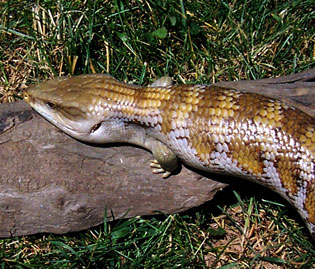Please help me! I am 11 years old, and I have a problem with my blue-tongued skink. He is kind of mean. I love him, but I want him to be nicer so t
Please help me! I am 11 years old, and I have a problem with my blue-tongued skink. He is kind of mean. I love him, but I want him to be nicer so that I can bring him places. He has bitten me a few times (two times, actually).
I want him to like people a lot.
Please give me some advice.
Unfortunately, you are probably not going to be happy with my answer! We must remember that these lizards are wild animals and not domesticated like our pet dogs and cats. So, if they perceive something to be scary or threatening to them, their natural instinct is to protect themselves, which in your case, means that it bites you! Wild animals have instincts. When threatened, scared or placed in a situation that they perceive that could possibly result in their injury, they will have a response called “fight or flight.” Their glands produce hormones that prepare them to either run away from what they think is a dangerous situation or to stay and fight. This is what may be going on when it bites. However without knowing what was going on when the skink bit you, it’s harder to give you advice.
He can’t be trained as you would a domesticated animal. Clicker training, punishment or rewards won’t work with your skink. It simply won’t understand why you are doing what you are doing to it.
Did you acquire the skink as an imported adult, or did you get a baby that you raised? Wild-caught adults, while often acting docile, may be scared on the inside. While blue-tongued skinks are generally thought of as being very docile and curious, they can deliver a powerful and painful bite, as you have discovered. When threatened, it can puff up the body to make itself appear larger, and then it will open its mouth, hiss and stick out that blue tongue to threaten an opponent. Even though they don’t have well-defined teeth, their bite sure can hurt! If your skink is puffing up and hissing, do not pick it up!
The other reason that blue-tongued skinks may bite is because they might think that pink fingers look a lot like pinky mice, which they enjoy eating. So, don’t handle your skink if it is hungry or hasn’t been fed yet for the day.
You should ask your parents to schedule an appointment with your herp vet to make sure that your blue tongue is not biting because it is uncomfortable or in pain from some illness. Because many vets don’t have much experience with these large skinks, your vet may want to schedule a consultation with a vet affiliated with the veterinary lab that they use, as this is a free service provided by the diagnostic labs to assist vets with cases such as yours. There is a CD ROM put out by ISIS, which is the zoo database, which has normals for blood work for blue-tongued skinks, as this is not easy information to acquire.
While I appreciate that you want to share your enthusiasm for your lizard with your friends, it is not a good idea to bring it places, as you asked about. Some people might be afraid of it, and it is not a good idea to put your lizard and people in that situation. Also, these lizards require a very warm environment to remain happy and healthy. Depending on which kind of blue-tongued skink you have, the basking spot should be between 90 and 100 degrees Fahrenheit, and the entire environment should have a temperature gradient from the mid-70s on the cool side to the mid-80s on the warm side. If you take it out and about with you, you won’t be able to keep it warm enough, and it might end up becoming ill.
Make sure that you wash your hands after handling your lizard. This is good practice for all herp owners. Anyone else that holds it should also wash thoroughly after handling.
I hope this information helps you. I know that it is disappointing that your skink has bitten you, but sometimes we just need to accept our pets the way they are and not expect them to be what they are not or cannot be.
Need a Herp Vet?
If you are looking for a herp-knowledgeable veterinarian in your area, a good place to start is by checking the list of members on the Association of Reptilian and Amphibian Veterinarian (ARAV) web site at www.arav.com. Look for DVMs who appear to maintain actual veterinary offices that you could contact.


